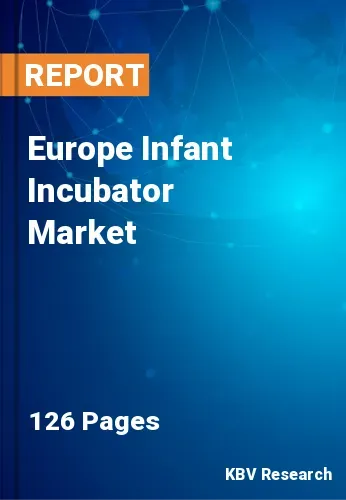The Europe Infant Incubator Market would witness market growth of 6.6% CAGR during the forecast period (2023-2030). In the year 2020, the Europe market's volume surged to 57.5 thousand units, showcasing a growth of 6.9% (2019-2022).
Newborns are carefully monitored and cared for within an infant incubator resembling a rigid box. Obstetric hospitals and neonatal intensive care facilities frequently utilize infant incubators. Premature or disabled infants, who are particularly vulnerable during the first few months of life, are the primary recipients of infant incubators. A rise in the incidence of preterm births propels market expansion. Enhanced awareness among individuals regarding neonatal care and the increased demand for NICU unit installation also contribute to expanding the market. During the forecast period, the market is expected to be impeded by the exorbitant expense of infant incubators and the limited awareness and accessibility of neonatal care in developing countries. Conversely, prosperous market expansion prospects are anticipated to arise throughout the projected timeframe due to technological advancements in neonatal care devices.
Consisting of a rigid box-shaped compartment, it is a biomedical apparatus that maintains a controlled environment by supplying the newborn with humidity, warmth, and oxygen. By regulating body temperature and ensuring the absence of pathogens, it enhances the likelihood of successful delivery of infants to life. A plush mattress encased in plastic and typically taking the form of a trolley constitutes the incubator unit. It protects the infant from dust, noise, infection, and excess handling, providing a clean environment. In the incubator chamber, a temperature sensor adjusts the heat and maintains a constant temperature for the infant. The incubator chamber is installed with a humidification system and electric heating system to maintain humidity and circulate humid air. These devices are essential to regulate the temperature of preterm infants as their regular metabolic rate is lower, leading to reduced heat production.
According to the Federal Statistical Office (Destatis) reports, in 2022, around 739,000 children were born in Germany. The growing birth rates in Germany increase the demand for neonatal care services. Hospitals and healthcare facilities need to accommodate a higher number of newborns, especially those born prematurely or with medical complications, necessitating the use of infant incubators. Integrating digital health technologies in neonatal care, such as smart monitoring systems and connectivity features, aligns with Germany's digital health trend. These advancements enhance the capabilities of infant incubators and contribute to their adoption. The factors mentioned above will propel the market growth in this region.
The Germany market dominated the Europe Infant Incubator Market, by Country in 2022, and would continue to be a dominant market till 2030; thereby, achieving a market value of $56,798.9 Thousands by 2030. The UK market is experiencing a CAGR of 5.7% during (2023 - 2030). Additionally, The France market would exhibit a CAGR of 7.4% during (2023 - 2030).
Free Valuable Insights: The Global Infant Incubator Market will Hit $944.9 Million by 2030, at a CAGR of 6.8%
The market research report covers the analysis of key stake holders of the market. Key companies profiled in the report include GE HealthCare Technologies, Inc., Natus Medical Incorporated (Archimed SAS), Atom Medical Corporation, Phoenix Medical Systems Pvt. Ltd., Dragerwerk AG & Co. KGaA, Inspiration Healthcare Group PLC, Medicor Elektronika Zrt., Fanem Ltda., Koninklijke Philips N.V., Médipréma Group.
By Product (Volume, Thousand Units, USD Million, 2019 to 2030)
By Application (Volume, Thousand Units, USD Million, 2019 to 2030)
By End User (Volume, Thousand Units, USD Million, 2019 to 2030)
By Country (Volume, Thousand Units, USD Million, 2019 to 2030)

Our team of dedicated experts can provide you with attractive expansion opportunities for your business.

